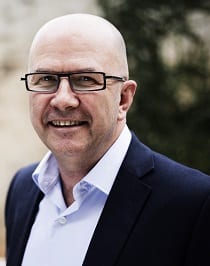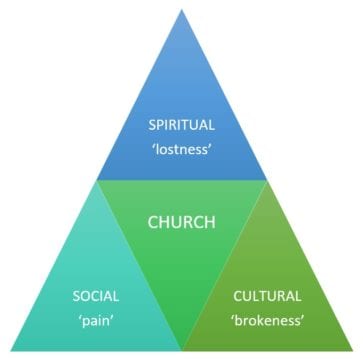 Three catalytic questions
Three catalytic questions
- What is the LOSTNESS of my city?
- What is the PAIN of my city?
- What is the BROKENNESS of my city?
No one church or ministry, no matter how large, can make a dent in the lostness, pain, and brokenness of a city or a region on their own.
In churches — and I don’t mean large churches only — we tend to want to concentrate on what WE are doing. Sometimes we can even come to believe that our church or our ministry is the only one out there doing good.
But if we become aware of the extent to which our communities have been damaged, we realize that this is a job bigger than any of us. We start asking new questions: questions about how we could have greater impact.
If the church is going to positively affect, and even transform our communities, we’re going to need to make a fundamental shift from our EGO systems to a Kingdom ECO system. We have to change our way of thinking and doing.
Much of the church’s engagement in the community in the past has focused on benevolence, not really transformation.
By transformation we mean shifting the needle in the spiritual, social and systemic (cultural) dimensions of city. Transformation will not happen unless we harness the collective capacity of the Kingdom.
Shared outcomes vs. shared activities
The tendency we see in many unity movements is shared activity without shared goals or outcomes. Churches and leaders might be willing to work together in a show of church-to-church bridge-building — and that’s a good thing — but it’s only more activity if they’re not consciously working toward the same goals and outcomes.
Defining shared outcomes empowers collaborative action by the churches in communities. Collaborative sharing in mission does not require congregations to make long-term organizational commitments to one another in activity, but rather to the shared outcome. Each role player can determine their contributions and activities within the framework of their own unique convictions. Although the approach to actions might differ, all are working together to achieve the same outcome.
What will it take to create a prolonged and sustainable unity movement within the Church that would transform whole regions for the Kingdom?
We suggest focusing on a simple but comprehensive framework, which would include spiritual, social, cultural objectives, goals and outcomes for the city. Think of your city as if it were a person, and ask yourself, “How could we more effectively minister to this entity?”
 This could be formulated by simply asking and answering the following three questions.
This could be formulated by simply asking and answering the following three questions.
- What is the LOSTNESS of my city?
- What is the PAIN of my city?
- What is the BROKENNESS of my city?
The threefold challenge to Christ followers
- A spiritual challenge: Owning the lostness of your community.
Estimate the number or percentage of unsaved people in your region/ or the evangelical presence, and see them as the group you’re dedicated to reaching.
- A social challenge: Own the pain of your region.
In what ways are people hurting in your area? For many, the breakdown of family, with all the social implications this brings, will be their primary focus.
- A systemic (cultural) challenge: Own the brokenness of your region.
What are the things that are broken in your area? Here, we contend with institutional components of society that define the way we do life. These constitute the cultural dynamic of the region. Education. The government. The justice system. Business. Arts and Media. What do these areas represent and what causes misalignment with Kingdom life and represents brokenness in the city? These spheres, when functioning well, form the basis of a healthy community. Let us continue to seek the peace of our city. This is the work that we as God’s people are called to do.
Toward the end of His life, Jesus prayed this to His Father:
“I have brought you glory on earth by completing the work you gave me to do” (John 17:4, NIV).
Alan Platt is the leader of Doxa Deo and City Changers Movement and also plays a support role to Church United South Florida.

Comments